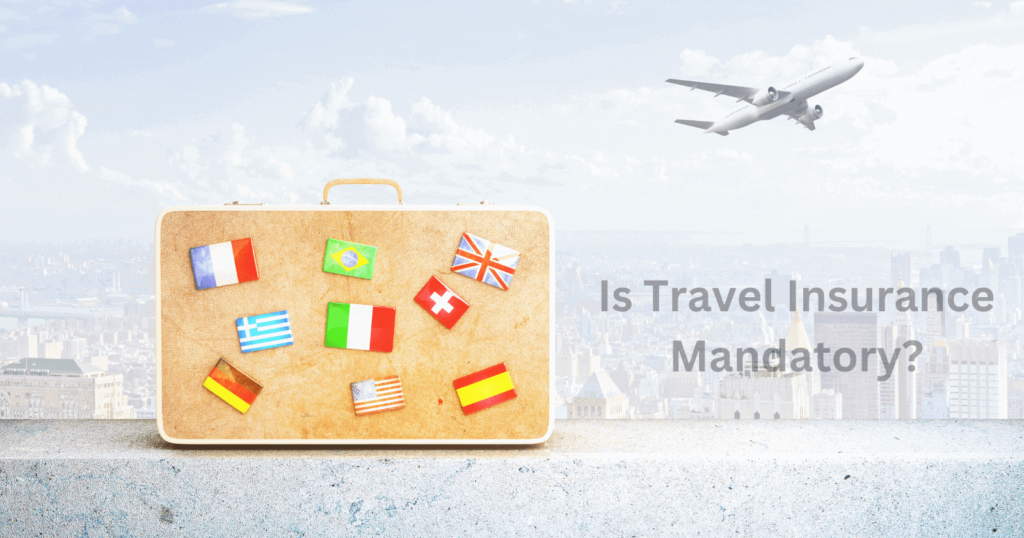Top 10 Myths Busted Regarding Travel Insurance
For a trip you have scheduled shortly, are you considering purchasing travel insurance? Prior to making any judgments, it is essential to discern between fact and fiction. In this essay, we’ll debunk the top ten myths about travel insurance and offer accurate justifications for them. Consequently, whether you’re a seasoned traveler or organizing your first trip, keep reading to discover the realities and myths surrounding travel insurance.
Commonly held false beliefs regarding travel insurance
Check out the popular myths about travel insurance that we’ve dispelled in this section.
Buying travel insurance is a waste of money.
One of the most pervasive beliefs is that getting travel insurance is a waste of money. A common belief is that buying something is useless because you’ll never need it. But this is as far from reality as it gets.
First and foremost, in the event of unanticipated events such as trip cancellations, lost luggage, or emergency medical attention, travel insurance may offer financial stability. These kinds of mishaps can be highly expensive and even ruin a vacation if there is no coverage.
Two more helpful services that can be gained with travel insurance are emergency medical transportation and travel support. These services could save your life in an emergency. They can help you find your way around a foreign area and quickly receive the help you need.
It could seem unnecessary to have travel insurance in general. But it might offer beneficial defense and assistance that, in the long run, can save you a lot of money and hassle. Therefore, before dismissing it as a financial waste, consider the potential benefits it might offer.
2. The only occasion when travel insurance is necessary is for international travel.
Another common misperception about travel insurance is the notion that it is only necessary for trips abroad. Many people think that since they will be going within their own country, they do not require travel insurance. But that’s not the case.
Travel insurance may be just as important for domestic travel as it is for international travel. Accidents and emergencies can happen anywhere. Even a quick journey could be disrupted by unforeseen events. So, whether you’re planning a local or international vacation, it makes sense to consider getting travel insurance as a way to protect both your trip investment and yourself.
3. Travel insurance is too expensive.
Another myth is that purchasing travel insurance is too expensive. Because they believe they cannot afford it, some people choose not to purchase travel insurance. Nevertheless, contrary to popular belief, this is untrue.
The length of your trip, your destination, and the type of coverage you choose can all have an impact on the price of your travel insurance. However, there are instances when travel insurance is surprisingly affordable.
Moreover, the expense of insurance pales in contrast to the possible monetary damages resulting from adverse events. If travel insurance isn’t in place, unplanned events could get very expensive.
Thus, don’t discount travel insurance as being excessively costly just yet. Instead, shop about and compare prices to get an insurance that fits inside your budget.
4. I’ll need to buy individual plans for each family member.
Many people believe that when a family travels together, each member needs to have their own travel insurance coverage. But things aren’t really like this.
Many family members’ add-ons are a typical component of travel insurance policies. This could simplify the insurance purchasing process and help you save money.
Often, one insurance policy might cover your spouse, children, and grandparents. Families might even qualify for savings through specific insurance policies. Make sure you contact your insurance company to find out the specifics and solutions that are suitable for your family.
5. My health insurance will cover all of my medical expenses while I travel.
Many people believe that their health insurance will cover all of their medical expenses when they travel. But this isn’t always the case.
Your health insurance may cover some of the medical expenses you incur when traveling, but not all of them. Certain health insurance policies have coverage limitations that don’t apply in other countries. Such insurance could not cover emergency medical transportation or other types of medical assistance.
On the other hand, travel insurance is specifically intended to cover medical expenses incurred while on the road. It might pay for emergency medical care, hospital stays, and even emergency medical transports. It may also offer you support services, such as helping you find a doctor or hospital nearby.
Since health insurance might not cover all medical expenses when traveling, it’s crucial to get travel insurance as an extra layer of protection.
6. In the event of a delay or cancellation, the airline will reimburse me.
In the event that their flight is canceled or delayed, many customers believe they will receive compensation from the airlines. But this isn’t always the case.
Airlines may not always be required to refund passengers for canceled or delayed flights. There might not be much money made even if they do. The airline only allows refunds or vouchers for flight costs. However, they might not cover additional expenses for things like lodging, meals, or transportation. Furthermore, certain airlines may have conditions that need to be met in order to be reimbursed. Examples include flight delays or cancellations brought on by particular occasions or circumstances.
Conversely, travel insurance could pay for disruptions, cancellations, and delays. It might also reimburse supplemental expenses for meals and housing.
In conclusion, compensation for canceled or delayed flights may not always be offered by airlines. Getting travel insurance is therefore the best choice if you want extra protection and assistance.
7. The only trips that require travel insurance are costly ones.
The idea that travel insurance is only necessary for expensive trips is a common fallacy. Some people think they only require it while planning an expensive or ostentatious getaway. That being said, this is not true.
The cost of your trip does not always indicate the likelihood that anything unexpected will occur. Unexpected events can occur on any vacation, regardless of how lavish or costly it is.
Moreover, even a small unexpected expense has the power to quickly add up and spoil your vacation. For example, an unexpected medical condition or a postponed vacation may result in additional expenses for housing, food, or transportation.
Therefore, whether you’re planning an expensive or opulent trip, it’s a smart idea to consider purchasing travel insurance.
8. I’ll be safe on an exciting journey thanks to travel insurance.
Many people believe that purchasing travel insurance will shield them from the financial fallout from any unplanned events or disasters that may occur while embarking on an exciting vacation. It is important to understand that some limitations and limits apply to travel insurance coverage.
Even while it might cover unanticipated circumstances, travel insurance might not cover all risk associated with an exciting adventure. As a matter of fact, many travel insurance policies specifically exclude certain types of activities, most notably adventure sports like skydiving, white water rafting, and bungies. Therefore, if you’re heading off on an adventurous holiday, it’s imperative to be sure your insurance covers the specific activities you wish to partake in.
Furthermore, it’s important to comprehend the policy’s exclusions and restrictions even in situations where coverage is given. For example, the coverage might not extend to emergency medical transport or specific medical procedures. The entire cost of the medical care may not always be covered by insurance.
Therefore, it’s important to understand the restrictions and limitations of travel insurance, even though it might offer some financial support during an enjoyable holiday.
9. Very few countries require travel insurance.
One common misconception regarding travel insurance is that it is only required if tnation to whichntry you are visiting mandates it. It is true that certain countries could require proof of travel insurance pentry. lowing entry. Travel insurance, however, may offer beneficial coverage in spite of this entrance restriction.
Costly medical care can be found even in countries with developed healthcare systems. For this reason, having travel insurance is essential to paying for the costs—especially if you have underlying medical issues.
Moreover, unexpected events can occur anywhere, at any time, and in whatever nation you travel to. If you have travel insurance, you may unwind and enjoy your trip without worrying about anything.
It is too late for me to purchase travel insurance.
Many people believe they are too old to need travel insurance. They might think that insurance companies impose age restrictions or that they are not eligible for coverage because of their health conditions. This isn’t always the case, though.
Though certain plans may have age restrictions, many insurance companies may cover travelers of all ages. In fact, several policies are specifically created to meet the needs of elderly travelers and may cover pre-existing medical conditions.
Therefore, don’t believe that you can’t receive travel insurance due of your age. Instead, make sure to ask your insurance provider about policies that meet your needs.
Frequently asked questions
This section addresses often asked questions concerning myths surrounding travel insurance.
If I have health insurance, do I still need travel insurance?
Even if you currently have health insurance, you should consider getting travel insurance. This is because there’s a chance that your health insurance won’t cover you while you’re overseas. Travel insurance may also pay for costs like emergency evacuation, misplaced or stolen luggage, and trip cancellation that health insurance does not. To gain a better grasp of the advantages and restrictions of each type of insurance, compare the terms of health and travel insurance side by side.
Is it true that travel insurance is only necessary for international travel?
No, travel insurance could be useful for both domestic and international travel. Unexpected events can happen anywhere, so having travel insurance can give you peace of mind and financial protection.
Does travel insurance only offer accidental coverage?
No, travel insurance also covers a range of other unfortunate events, such as accidents. Many times, coverage includes illness, postponed travel, lost or stolen luggage, among other things. Finding out what is covered requires comparing the coverage offered by different plans.
Is it true that purchasing travel insurance is an unnecessary expense?
No, it is not a poor investment to purchase travel insurance. It might offer priceless defense against unanticipated events that might occur when traveling. As a result, it might offer you mental and financial stability. It’s important to evaluate the coverage offered by several insurance companies and select the one that most closely matches your needs and budget.


